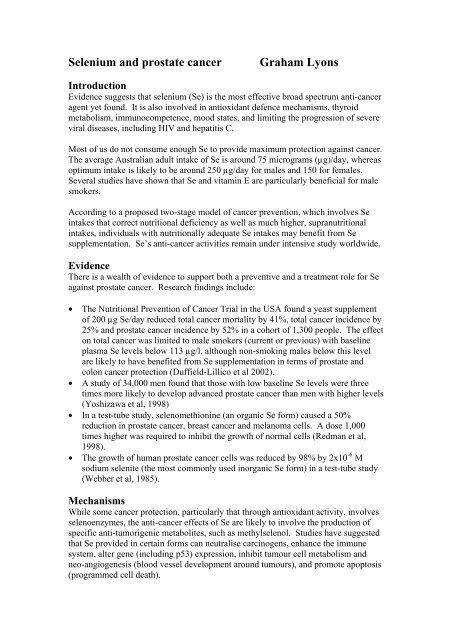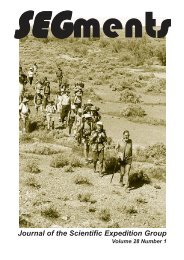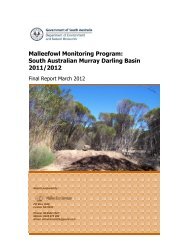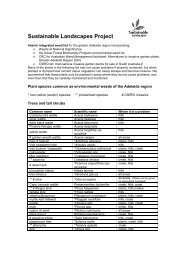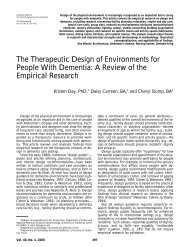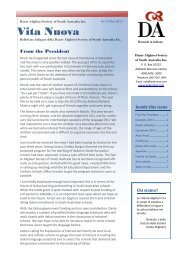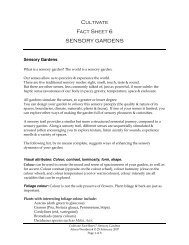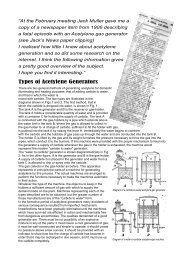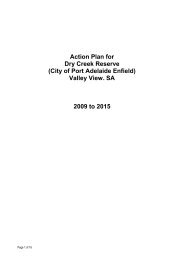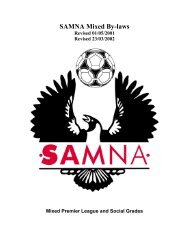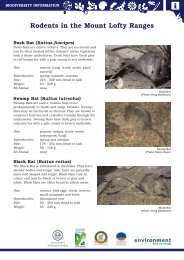Selenium and prostate cancer Graham Lyons - Communitywebs.org
Selenium and prostate cancer Graham Lyons - Communitywebs.org
Selenium and prostate cancer Graham Lyons - Communitywebs.org
Create successful ePaper yourself
Turn your PDF publications into a flip-book with our unique Google optimized e-Paper software.
<strong>Selenium</strong> <strong>and</strong> <strong>prostate</strong> <strong>cancer</strong><br />
<strong>Graham</strong> <strong>Lyons</strong><br />
Introduction<br />
Evidence suggests that selenium (Se) is the most effective broad spectrum anti-<strong>cancer</strong><br />
agent yet found. It is also involved in antioxidant defence mechanisms, thyroid<br />
metabolism, immunocompetence, mood states, <strong>and</strong> limiting the progression of severe<br />
viral diseases, including HIV <strong>and</strong> hepatitis C.<br />
Most of us do not consume enough Se to provide maximum protection against <strong>cancer</strong>.<br />
The average Australian adult intake of Se is around 75 micrograms (µg)/day, whereas<br />
optimum intake is likely to be around 250 µg/day for males <strong>and</strong> 150 for females.<br />
Several studies have shown that Se <strong>and</strong> vitamin E are particularly beneficial for male<br />
smokers.<br />
According to a proposed two-stage model of <strong>cancer</strong> prevention, which involves Se<br />
intakes that correct nutritional deficiency as well as much higher, supranutritional<br />
intakes, individuals with nutritionally adequate Se intakes may benefit from Se<br />
supplementation. Se’s anti-<strong>cancer</strong> activities remain under intensive study worldwide.<br />
Evidence<br />
There is a wealth of evidence to support both a preventive <strong>and</strong> a treatment role for Se<br />
against <strong>prostate</strong> <strong>cancer</strong>. Research findings include:<br />
• The Nutritional Prevention of Cancer Trial in the USA found a yeast supplement<br />
of 200 µg Se/day reduced total <strong>cancer</strong> mortality by 41%, total <strong>cancer</strong> incidence by<br />
25% <strong>and</strong> <strong>prostate</strong> <strong>cancer</strong> incidence by 52% in a cohort of 1,300 people. The effect<br />
on total <strong>cancer</strong> was limited to male smokers (current or previous) with baseline<br />
plasma Se levels below 113 µg/l, although non-smoking males below this level<br />
are likely to have benefited from Se supplementation in terms of <strong>prostate</strong> <strong>and</strong><br />
colon <strong>cancer</strong> protection (Duffield-Lillico et al 2002).<br />
• A study of 34,000 men found that those with low baseline Se levels were three<br />
times more likely to develop advanced <strong>prostate</strong> <strong>cancer</strong> than men with higher levels<br />
(Yoshizawa et al, 1998)<br />
• In a test-tube study, selenomethionine (an <strong>org</strong>anic Se form) caused a 50%<br />
reduction in <strong>prostate</strong> <strong>cancer</strong>, breast <strong>cancer</strong> <strong>and</strong> melanoma cells. A dose 1,000<br />
times higher was required to inhibit the growth of normal cells (Redman et al,<br />
1998).<br />
• The growth of human <strong>prostate</strong> <strong>cancer</strong> cells was reduced by 98% by 2x10 -6 M<br />
sodium selenite (the most commonly used in<strong>org</strong>anic Se form) in a test-tube study<br />
(Webber et al, 1985).<br />
Mechanisms<br />
While some <strong>cancer</strong> protection, particularly that through antioxidant activity, involves<br />
selenoenzymes, the anti-<strong>cancer</strong> effects of Se are likely to involve the production of<br />
specific anti-tumorigenic metabolites, such as methylselenol. Studies have suggested<br />
that Se provided in certain forms can neutralise carcinogens, enhance the immune<br />
system, alter gene (including p53) expression, inhibit tumour cell metabolism <strong>and</strong><br />
neo-angiogenesis (blood vessel development around tumours), <strong>and</strong> promote apoptosis<br />
(programmed cell death).
Dose rates<br />
Suggested <strong>prostate</strong> <strong>cancer</strong> preventive Se intake: 250 µg/day.<br />
Suggested treatment Se intake: for example, as part of a <strong>prostate</strong> <strong>cancer</strong> “watchful<br />
waiting” program, or for recurrent <strong>prostate</strong> <strong>cancer</strong>, or to accompany chemotherapy or<br />
radiotherapy for various <strong>cancer</strong>s: 300-1,000 µg/day. Se is more effective against<br />
<strong>prostate</strong> <strong>cancer</strong> when taken with gamma-tocopherol, a form of vitamin E found in<br />
sesame seed: take a tablespoon of Tahini per day.<br />
NB: micronutrients like Se are required by the body only in small amounts.<br />
Remember that 1 µg is equal to just one-thous<strong>and</strong>th of a milligram! Treatment doses<br />
of Se should not exceed 1,500 µg/day. The treatment of <strong>cancer</strong> <strong>and</strong> other serious<br />
illnesses should be supervised by a qualified medical practitioner.<br />
Other natural anti-<strong>prostate</strong> <strong>cancer</strong> agents<br />
Other supplements (with dietary sources) which may be beneficial in <strong>prostate</strong> <strong>cancer</strong><br />
prevention <strong>and</strong> treatment include gamma-tocopherol (sesame seed), lycopene (tomato<br />
paste), genistein (red clover or soy extract), epigallocatechin-3-gallate (green tea),<br />
phenethyl isothiocyanate (watercress), gamma-linolenic acid (blackcurrant seed oil),<br />
resveratrol (grape seed), glycorrhizin (licorice), vitamin D3-calcitriol (cod liver oil),<br />
vitamin C (high-dose calcium ascorbate, ie 5-12 grams/day), beta-sitosterol (Saw<br />
Palmetto), Urtica (stinging nettle) <strong>and</strong> Baikal skullcap.


